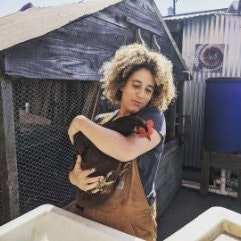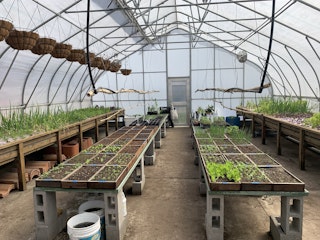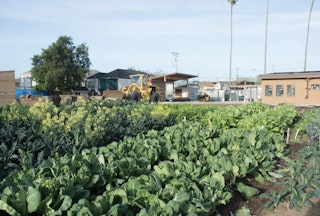Animal keeping, grazing, or feeding is permitted under the Community Gardens and Extensive Agriculture classifications in selected zones (refer to the code summaries listed above), and must conform to all applicable regulations. Sales of animal products are limited seasonally within Community Gardens, and require a Conditional Use Permit (CUP) within Extensive Agriculture operations.
For more on the City of Oakland's Animal Control Regulations, visit the Municode website.
City Code and Zoning Resources
Activities Permitted by Zone
| Activity Type | Definition | Permitting by Zone |
|---|---|---|
Community Gardens |
Community Gardens are defined as land that is used for the cultivation of fruits, vegetables, plants, flowers, herbs, ornamental plants, and/or animal products and livestock production by one or more persons for personal consumption and/or donation. This classification does not include the use of heavy mechanized farming equipment, or commercial sales on or off the premises, except for limited seasonal sales. Any keeping, grazing, or feeding of animals must conform to all applicable regulations, including but not limited to Municipal Code Chapters 6.04, 8.14, and 8.18. |
Permitted outright in zones RH-1, RH-2, RH-3, RH-4, RD-1, RD-2, RM-1, RM-2, RM-3, RM-4, RU-1, RU-2, RU-3, RU-4, RU-5, R-80, CC-1, CC-2, CC-3, CR-1, C-40, C-45, M-30, M-40, CIX-1, and CIX-2. Permitted outright in zones CIX-1A, CIX-1B, CIX-1C, and CIX-1D — EXCEPT when combined with T Overlay — then Conditional Use Permit (CUP) required. Permitted outright in zones CN-1, CN-2, CN-3, CN-4, CBD-R, CBD-P, CBD-C, CBD-X, HBX-1, HBX-2, HBX-3, HBX-4, M-20, CIX-1A, CIX-1B, CIX-1C, CIX-1D, S-1, S-2, S-3, S-15, S-15W, D-BV-4, D-KP-1, D-KP-2, D-KP-3, D-CE-3, and D-CE-4 — UNLESS project includes the cultivation of any animals, animal products, and/or livestock production, other than bee keeping involving no more than three (3) hives — then CUP required. Prohibited in zone D-GI. |
Limited Agriculture |
Limited Agricultural Activities include the cultivation on the premises of fruits, vegetables, plants, flowers, herbs, and/or ornamental plants intended to produce food, fibers, or other plant products for on- or off-site sale. This classification also includes certain activities accessory to the above, as specified in Section 17.10.040. This classification does not include the keeping, grazing, or feeding of animals, except for bee keeping involving no more than three (3) hives; the use of any heavy mechanized farming equipment; or any activity classified in Section 17.10.600 Plant Nursery Agricultural Activities. |
Permitted outright in zones RH-1, RH-2, RH-3, RH-4, RD-1, RD-2, RM-1, RM-2, RM-3, RM-4, RU-1, RU-2, RU-3, RU-4, RU-5, R-80, HBX-1, HBX-2, HBX-3, HBX-4, D-CE-3, and D-CE-4 WITH limitations for residential zones. Permitted outright in zones CN-3, CN-4, CC-1, CC-2, CC-3, C-40, C-45, CBD-R, CBD-P, CBD-C, CBD-X, M-20, M-30, M-40, CIX-1, CIX-2, S-1, S-2, S-3, S-15, S-15W WITH limitations for commercial/industrial zones. Permitted outright with limitations for commercial/industrial zones — EXCEPT when combined with T Overlay — then CUP required. Additional Conditional Use Permit (CUP) findings required* in zones CN-1, CN-2, IG, IO, D-WS, D-OTN, D-BV-4, D-KP-1, D-KP-2, D-KP-3, D-CE-1, D-CE-2, D-CE-5, and D-CE-6. * For Limited Agriculture CUPs:
Prohibited in zones OS (all types), D-BV-1, D-BV-2, D-BV-3, and D-GI. |
Extensive Agriculture |
Extensive Agricultural Activities include the keeping, grazing, or feeding of animals by agricultural methods, including bee keeping involving more than three (3) hives, intended to provide animals or animal products for on- or off-site sale; and agricultural activities not included in Section 17.10.610 Limited Agricultural Activities, including but not limited to the use of any heavy mechanized farming equipment. |
Additional Conditional Use Permit (CUP) findings required* in zones RH-1, RH-2, RH-3, RH-4, RD-1, RD-2, RM-1, RM-2, RM-3, RM-4, RU-1, RU-2, RU-3, RU-4, RU-5, R-80, CC-1, CC-2, CC-3, C-40, C-45, CBD-R, CBD-P, CBD-C, CBD-X, HBX-1, HBX-2, HBX-3, HBX-4, M-20, M-30, M-40, CIX-1A, CIX-1B, CIX-1C, CIX-1D, CIX-1, CIX-2, IG, IO, S-1, S-2, S-3, S-15, D-WS, D-OTN, D-BV-4, D-CE-1, D-CE-2, D-CE-3, D-CE-4, D-CE-5, and D-CE-6. Additional CUP findings required* for animal raising required in zones CN-1, CN-2, CN-3, and CN-4. CUP with additional findings required* for extensive agriculture in zone CR-1, BUT prohibited within 300 feet of Hegenberger Road. Additional CUP findings in Section 17.97.100 required* in zones S-15 and S-15W. * For Extensive Agriculture CUPs:
Prohibited in zones OS (all types), D-BV-1, D-BV-2, D-BV-3, D-KP-1, D-KP-2, D-KP-3, and D-GI. |
Raising Chickens, Bees and Other Animals

Apply for Permits
If your community garden or urban agriculture project is not "permitted outright" in your zone as outlined above, you must apply for permits.
APPLY ONLINE:
Ready to get started? First, make sure you are registered and activated at our Online Permit Center. For instructions, please visit our Planning & Building Video Tutorials webpage.
- Submit a Zoning Worksheet through our Online Permit Center*
* NOTE: You will be taken to our login page first before you can submit a Zoning Worksheet - In the Worksheet, upload your completed Basic Application for Development Review and all associated site plans and documents. Please indicate what type(s) of agricultural or gardening activities are being proposed on the property, any new proposed structures or additions or conversions, and any Mechanical, Electrical and Plumbing (MEP) work that may be performed
- If your proposed project requires a Conditional Use Permit (CUP) as per zoning requirements as outlined above, you must also upload a completed CUP Findings Application, as well as a Supplemental Activities Questionnaire.
- A planner will review your submission
- Please note that public notice of your project will be required
- Once approved, you will receive a decision letter from the Bureau of Planning
WHAT'S NEXT?
Once we receive your application, staff will review your documents for completeness. If further information is needed, a planner will contact you at the email address provided. For the latest processing estimates, please see our Average Permit Processing Turnaround Times webpage.
QUESTIONS?
Call (510) 238-3911 or find quick answers through our Permit Questions Portal. You may also schedule an appointment with Permit Counter staff during open hours.
Local Projects
The following are examples of permitted community gardens and urban farms in Oakland. The City of Oakland does not endorse or prefer any of these over other projects. They are listed here for informational purposes only.

Project Name: Acta Non Verba: Youth Urban Farm Project (ANV)
Activity Type: Community Gardens
Address: 1001 E Street, Oakland
Zoning Requirements: Conditional Use Permit (CUP) required for Community Gardens in an Open Space (OS) Zone
Permit Secured: Conditional Use Permit #CU11126, authorizing the establishment of a community garden within a neighborhood park.
Project Description (from website): "Acta Non Verba: Youth Urban Farm Project elevates inner-city life by challenging oppressive dynamics and environments through urban farming. We inspire 3,000+ low-income youth and families to focus on wellness, education, and improving quality of life in Elmhurst through access to farming beds, nutrition and cooking classes, community building events, educational childcare camps for 300+ local youth, a CSA, food pantry, and farmstand provides produce to residents (accepting EBT payments), and installation of gardens in local schools with partner Alameda County."

Project Name: O2 Artisans Aggregate (O2AA)
Activity Type: Limited Agriculture
Address: 2311 Magnolia Street, Oakland
Zoning Requirements: Permitted outright with limitations for Limited Agriculture within a CIX-1A Industrial Zone
Permit Secured: Zoning Clearance permit #ZC171830, authorizing custom manufacturing for fabrication and installation of wooden furniture, garden structures.
Project Description (from website): "O2 Artisans Aggregate (O2AA), an eco-industrial park located in West Oakland, is home to a network of artisans working collectively to develop and promote environmentally progressive projects. The systems created at O2 enable tenants and the community to utilize alternative energies & reduce and up-cycle various waste-streams.
Organized by the founder of Joinery Structures, Paul Discoe, the Aggregate is comprised of tenants who practice interactive and sustainable methods by sharing spaces, resources, tools and machinery. A core team of project developers works on-site to incubate and manage new efforts, as well as expand the scope and scale of O2AA.
Some of our systems include aquaponic gardening and fish farming, solar power production, waste water digestion for re-use, the construction of a community kitchen space, bio-char and bio-chip production, composting facilities and up-cycling food waste to create a sustainable animal feed."

Project Name: City Slicker Farms
Activity Type: Extensive Agriculture
Address: 2847 Peralta Street, Oakland
Zoning Requirements: Conditional Use Permit required for Extensive Agriculture within a HBX-2 Housing and Business Mix Commercial Zone
Permit Secured: Development / Conditional Use Permit #CM13348, authorizing Crop and Animal Raising Activities (and a private park/recreational assembly).
Project Description (from website): "City Slicker Farms began with a mission to empower West Oakland community members to meet the basic need for fresh, healthy food by creating sustainable, high-yield urban farms and backyard gardens. Since its founding in 2001, City Slicker Farms has been at the forefront of the 21st-century sustainable urban farming and food justice movement, gaining national recognition as a leader in supporting low-income communities of color to grow food in the city. In those sixteen years, they have built over 400 backyard and community gardens, produced 300,000 pounds of nutrient rich food, and trained thousands of community members in organic gardening methods and environmental stewardship."
About
Background on Urban Agriculture in Oakland
Oakland's old rules for urban agriculture were outdated and vague, which required a comprehensive revision to keep up with the latest urban farming practices. The urban agriculture update was also initiated to implement policies and actions in the Open Space and Conservation Element of the General Plan and the Draft Energy and Climate Action Plan. These new regulations will further Oakland's goal of becoming a more sustainable city.
After extensive consultation with residents, urban farmers, and community-based organizations, the City of Oakland's new urban agriculture regulations were adopted by the City Council on November 18, 2014 and became effective on December 18, 2014.
New Classifications for Urban Agriculture
The adopted code amendments differentiate Crop Raising from Animal Raising. Specifically, the Urban Agriculture-related changes include a modification to the existing definition of “Community Gardens” and the creation of the following two new Land Use Activity Types to replace the City’s prior “Crop and Animal Raising” Activity Type: “Limited Agriculture” and “Extensive Agriculture”. By separating the current “Crop and Animal Raising” regulation into two different agricultural land use categories based on level of intensity and the potential for off-site impacts, and redefining Community Gardens as the activity of one or more persons, the adopted Planning Code amendments vastly increase the public’s ability to practice small-scale agriculture throughout the City. The revisions to the Permitted Activity Charts throughout the Planning Code specify when “Community Gardens”,“Limited Agriculture”, and “Extensive Agriculture” are a Permitted, Conditionally Permitted, or Prohibited Activity (see the summary charts links above that list the proposed level of allowed activity for “Community Gardens”, “Limited Agriculture”, and “Extensive Agriculture” in each Zoning District).
QUESTIONS?
If you have questions regarding these regulations or obtaining permits for your operation, please contact the Zoning Hotline at (510) 238-3911 or visit the Zoning Counter at the Permit Center on the 2nd Floor of 250 Frank Ogawa Plaza.
